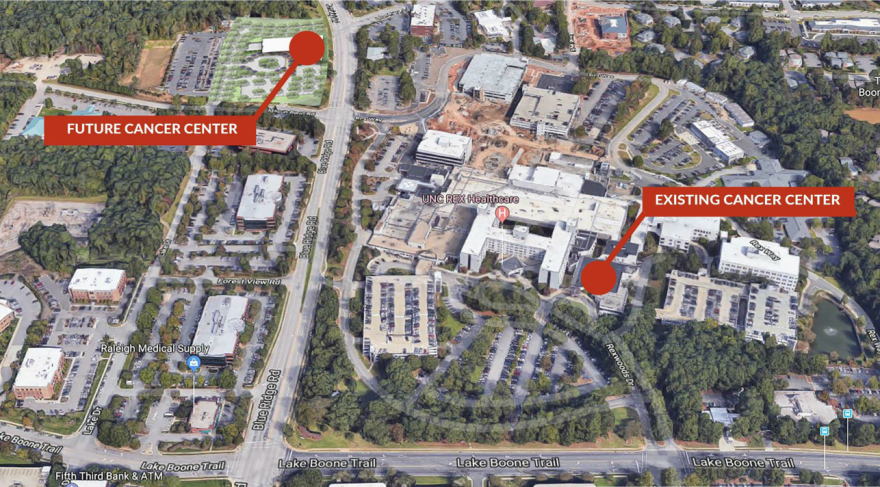UNC Rex Healthcare announced a plan to build a $65 million cancer center at its west Raleigh campus. The new center will ratchet up competition with Duke Raleigh Hospital – which already has two cancer centers, including one in the shadow of Rex's campus – and sets up the UNC Health Care system hospital to pad its bid for a new piece of expensive medical equipment in 2019.
Last year, Rex officials said the hospital saw 5,600 new cancer patients, a 30 percent increase from the year prior. UNC Rex will fund the project through capital reserves and fundraising, and borrow the remainder.
Health care facilities and equipment are regulated more tightly in North Carolina than most other states, and hospitals need state approval before adding licensed beds or major medical equipment. From a regulatory standpoint, UNC Rex isn't adding any services with this 145,000 square-foot cancer center, so it doesn't require state approval. By consolidating services, adding square footage and service hours, and offering add-on services like a Quality of Life Clinic with support services for cancer patients, Rex leadership says it will improve the overall care it offers patients. In that sense, this cancer center is similar to the N.C. Heart and Vascular Hospital on Rex's growing campus off Blue Ridge Road, a major project that didn't add any regulated services.
"We believe our new Cancer Center will create a hub for oncology care for patients from across Wake County and Eastern North Carolina," said UNC Rex President Steve Burriss in a news release. "This center will provide a new home to care for more people who rely on us for treatment and support during a cancer diagnosis."
The cancer center will share another similarity with the heart and vascular hospital. That center was built at least partly to compete more fiercely with WakeMed Health and Hospitals for cardiovascular patients, where WakeMed had long been Wake County's volume leader.
Duke Health offers cancer care at two main locations in Wake County: At Duke Raleigh Hospital off Wake Forest Road just outside the beltline, and Duke Cancer Center Macon Pond very close to Rex. In the same way that Rex competes for cardiovascular patients with WakeMed, it competes for cancer patients with Duke Raleigh.
Radiation therapy is used in the treatment of about half of all cancers, and a Linear Accelerator is the device most use to deliver that radiation. Rex had been the volume leader, but Duke Raleigh closed the gap in 2015 when it acquired Cancer Centers of North Carolina, a cancer care provider very close to Rex's campus. The new cancer center and the now-renovated, former Cancer Centers of N.C., now Duke Cancer Center Macon Pond, will be virtually side by side.
Last year, Duke Raleigh performed 18,146 procedures using its four Linear Accelerators – often shortened to LinAc. Rex performed 24,281 on its four LinAcs. UNC REX Cancer Care of East Raleigh performed another 275 such procedures, and no other provider in Wake County offers the service.
For context, UNC Hospitals has six LinAcs and performed 39,384 procedures last year, and Duke University Hospital has eight LinAcs and performed 38,895 procedures. Statewide, 600,000 procedures were done using 127 LinAcs. All data come from the N.C. Department of Health and Human Services.
Although Rex won't add any new regulated services at the new cancer center, it could pad Rex's application for a PET scanner in 2019. State regulators have already determined a need for one additional Positron Emission Tomography Scanner, a piece of equipment that helps with medical diagnosing, including in oncology.
Pieces of major medical equipment come with high up-front costs, but are typically money makers for large hospitals in the long run because of the sometimes high reimbursement rates associated with each scan. Health systems don't comment on future regulatory applications, but it's almost certain that Rex – along with other hospitals in Wake County – will apply for regulatory approval to add the PET Scanner.
Regulators have determined the need for just one additional scanner in the geographic area, which means hospitals will compete against one another for approval. Rex could use the new cancer center to make its application more appealing.









